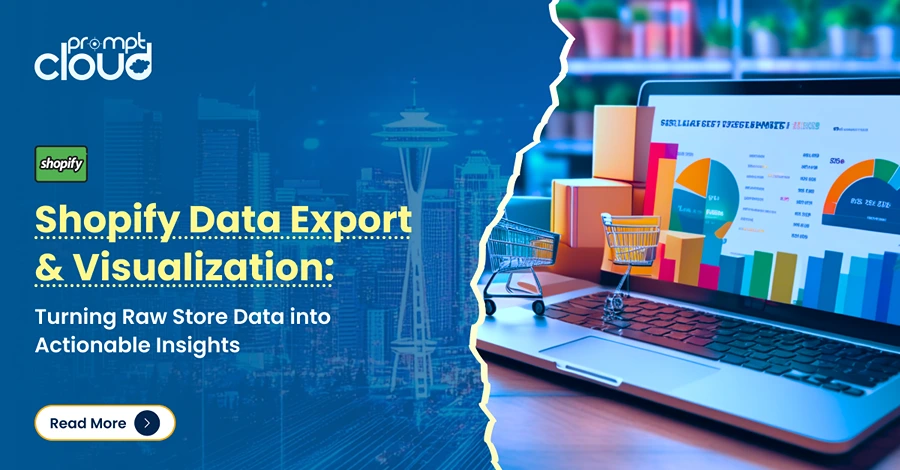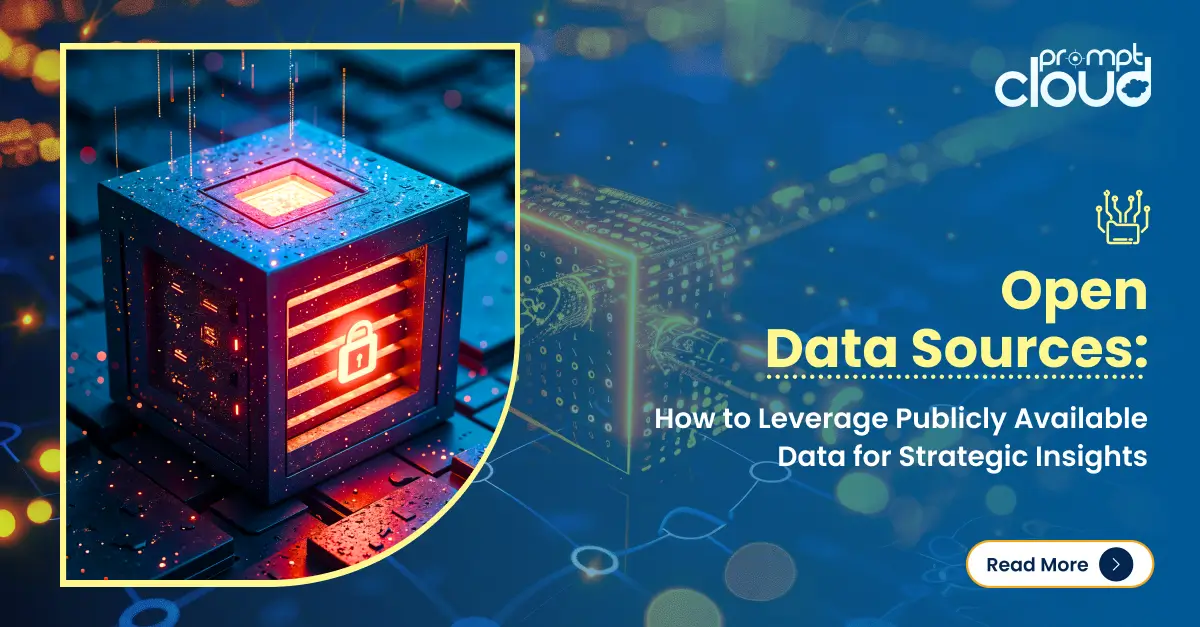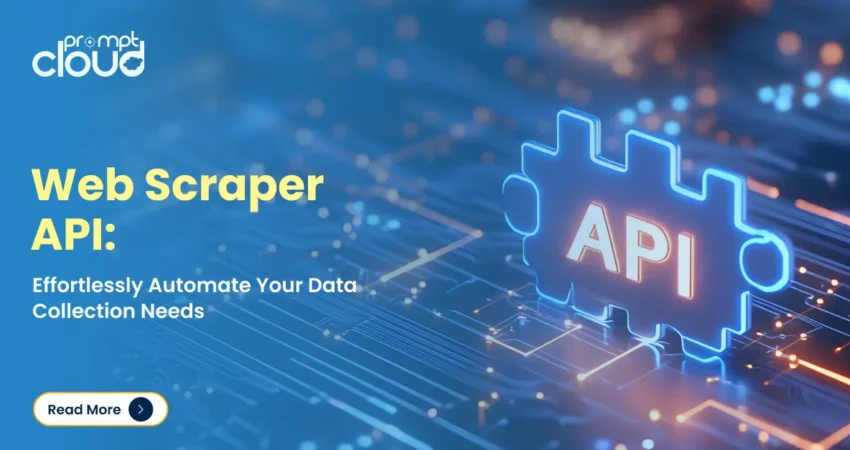
Data is the most valuable asset in today’s world and everyone is well aware of it. This sentiment holds, whether you are working as an analyst, developer, or are a part of a marketing team. However, the process of obtaining and analyzing data can be very exhaustive, to say the least.
The manual method of data collection out of websites is now obsolete. Businesses and teams can now easily automate the process of data collection through Web Scraper APIs which in return saves valuable time and resources.
In this article, we will look into how a Web Scraper API can automate your data scraping, streamline workflows, and integrate effortlessly into your applications. We will also look for the best options for free web scraper APIs, compare API web scrapers, and help you decide whether to get a web scraper API or opt for traditional scraping strategies.
What is a Web Scraper API? & How Does It Work?
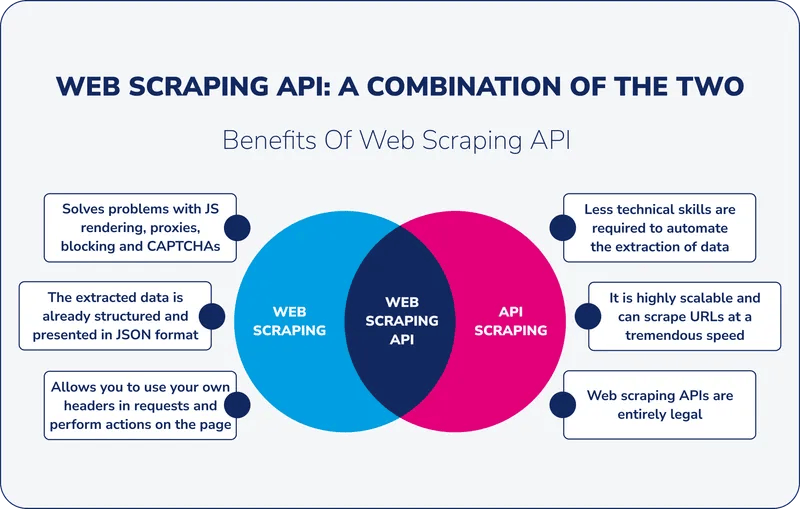
Image Source: Hasdata
A Web Scraper API is software that enables the user to obtain data off of web pages automatically and in a structured manner. It becomes a medium between the application and the data that needs to be scraped and allows easy and efficient retrieval of standardized data from the internet.
Ideally, web scraping is for useful information like pricing, job listings, products, customer reviews, and so on. Rather than doing this work manually, you can automate the process with a Web Scraper API allowing developers more time to focus on analyzing information and making the right decisions.
Such APIs have endpoints that can be integrated into applications to request structured data. The web scraper takes the raw information or HTML of a webpage, extracts the needed details, and sends it back in a more usable format such as JSON or CSV.
How a Web Scraper API Simplifies Your Data Collection Process?
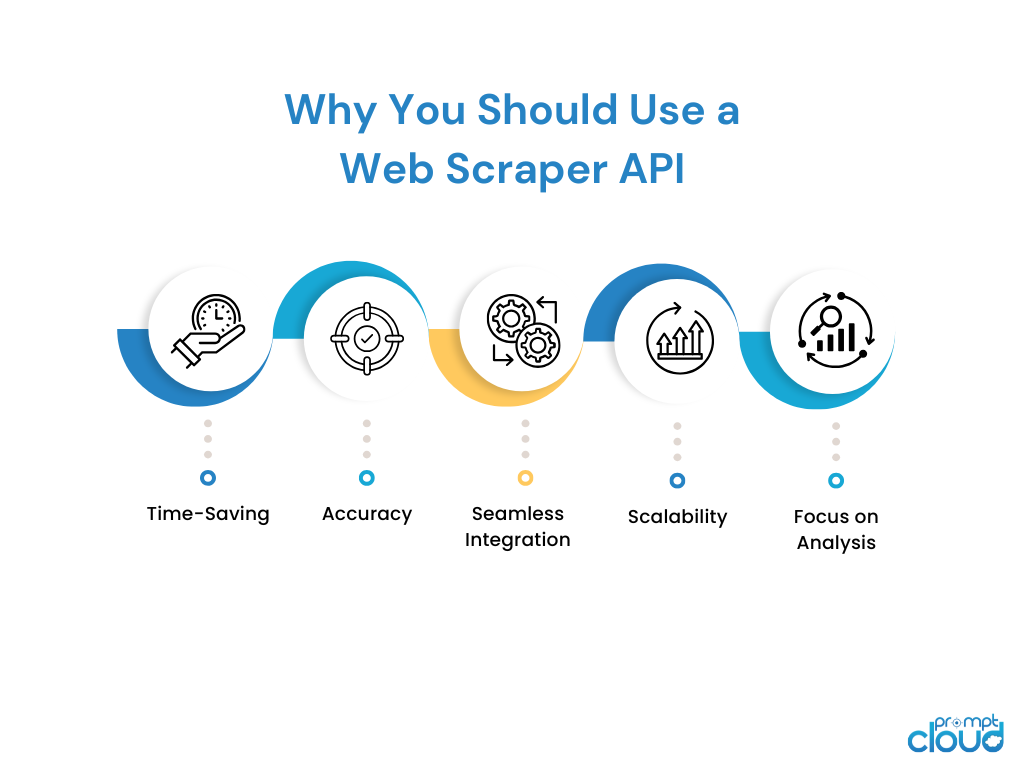
Web Scraper APIs are extremely beneficial when automating web scraping tasks. Hidden from the eye, Web Scraper APIs provide a multitude of advantages. Here are some of the benefits that you can enjoy with them:
- Time-Saving: With API scraping, collecting data becomes a walk in the park. Set up specific times to scrape data for a project and the instance you require data, it will be up-to-date.
- Accuracy: With automation, the risks of miss-collecting data caused by human errors will be minimized. The Web Scraper API will ensure precise data retrieval.
- Seamless Integration: Whether the existing applications and platforms are on Python, Java, or some entirely different language, web scraping API integration is effortless. There is no hassle regardless of the requirement of the application.
- Scalability: The rapid growth of a business correlates with the added need for data. Instead of struggling to collect data from mere hundreds of websites, these web APIs allow simultaneous collection from tens of thousands of websites. With Web Scraper APIs your data collection efforts can easily be ramped up.
- Focus on Analysis: With web scraping API, the hard work of extracting and cleaning the data is easier, allowing you to focus on extracting insights and making predictions. Be it consumer insight for a marketing team or trend prediction for a data analyst, web scraper makes everything effortless.
How to Choose Best Web Scraper API for Your Data Collection Needs?
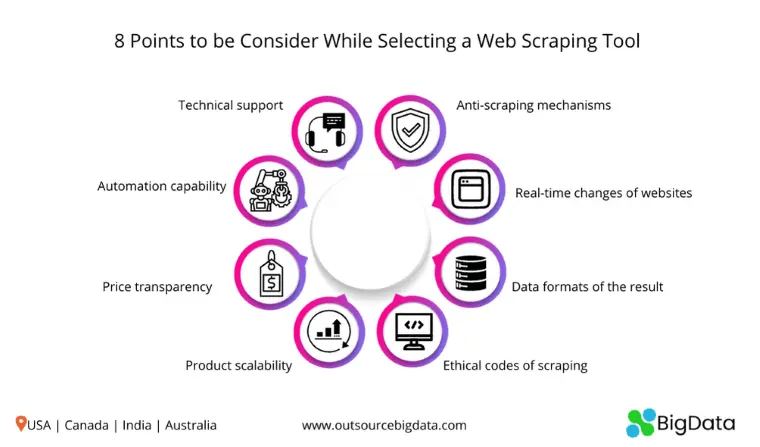
Image Source: OutsourceBigData
Web scraping APIs come with unique elements and pricing models. When considering what is best for your business, these elements stand out.
1. Ease of Use
Depending on your skill, the appropriate scraping plan could be selected across different costs for various large companies. This could either be free for low-volume scrapers, or you could be paying for a mid-range class plan.
Such services are very popular among businesses and will successfully merge with your projects. Every business has its own unique requirements and therefore is best suited for certain budgets.
2. Data Structure and Output Format
The API should return data in a format that is easy to work with. Most Web Scraper APIs offer responses in JSON or CSV format, both of which are ideal for data analysis. Ensure that the API can extract data in the specific format that suits your needs.
3. Pricing and Flexibility
Different APIs come with different pricing models. Some may offer free web scraper API plans with limited usage, while others offer paid plans based on the volume of data scraped or the number of requests you make.
Be sure to evaluate your business needs and select an API that provides the best value for your budget.
4. Customization and Flexibility
Flexibility is of the utmost importance when choosing a Web Scraper API. A good sophisticated API should be able to scrape data regardless of the type of website.
Features such as support for bypassing CAPTCHAs, scraping content from dynamic websites, and e-commerce, social media, or real estate sites should be supported.
5. Support and Reliability
Selecting a vendor that has good customer service responsiveness is also crucial when choosing a Web Scraper API.
With responsive support in case of an issue, such as a malfunction with the API or challenges in data scraping, time and resources can be saved greatly.
Top Free Web Scraper APIs for Automated Data Extraction
Free Web Scraper APIs can be incredibly useful for business owners looking to cut down on expenses. Here is what a free API Scraper can do and the disadvantages of it:
Advantages Of Free Web Scraper APIs:
- Cost-Efficient: Small businesses, developers, and startups who do not have a large budget can greatly benefit from a free Web Scraper API.
- Effective Testing: An API that is free to use allows testing without requiring a subscription, making the transition effortless if the service is satisfactory, or bypassable if not.
- Basic Features: Many APIs that are free to use offer basic features that are more than enough for small projects, such as limited request rates and extracting ample amounts of data.
Disadvantages Of Using Free Web Scraper APIs:
- Minimal Features: Free APIs come with restrictions concerning the amount of data, request rate, and level of features one can use.
- Problems With Scalability: When a user’s demand for data access increases, they are left with a free Web Scraper API which is of no use.
- Rate Limits: Free tier plans are often bundled with free rate limits, which means that there are only a certain number of requests per month or day.
For those with simple needs, free web scraper APIs are an accessible option. Alternatively, complex or more extensive work would require additional features and flexibility provided in paid plans.
Comparing Web Scrapers and APIs: Which One Should You Use?
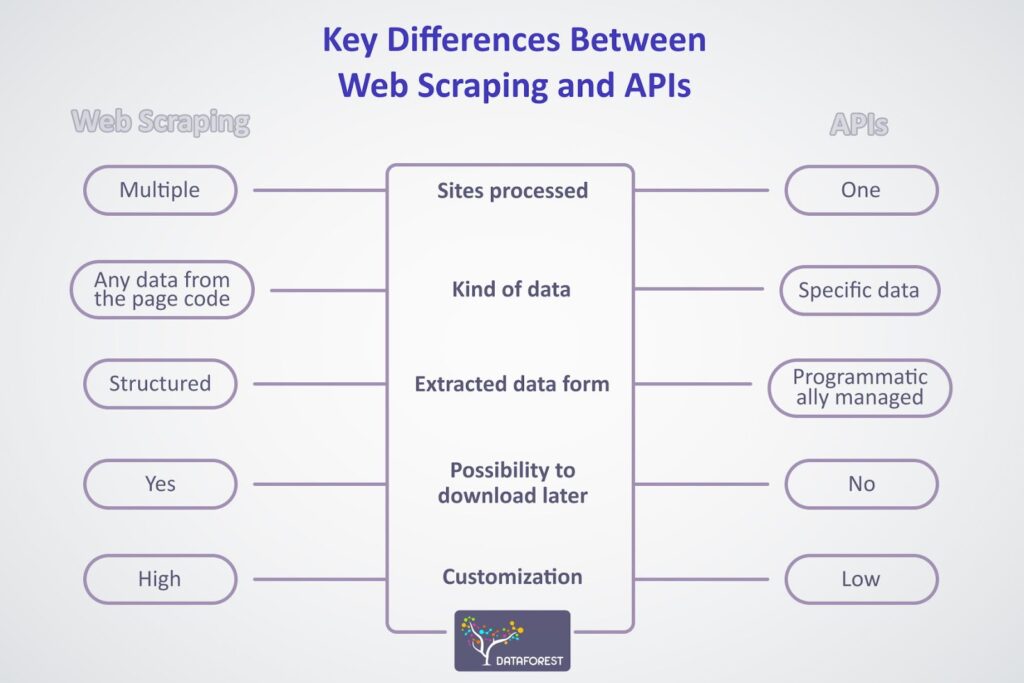
Image Source: Dataforest
Several aspects will dictate whether you choose a Web Scraper API or build your own custom scraper. These tips include;
- How Simple It Is To Use
Web Scraper API: Embedding a Web Scraper API in your applications is as simple as clicking a single button. You can incorporate them seamlessly, allowing you to gather data with very little effort.
Custom Scraper: A custom scraper is built from scratch which has its advantages and drawbacks. The advantages are, that you have full control over the scraper; however, the drawbacks are constantly dealing with the complexities surrounding dynamic websites and the potential for encountering CAPTCHAs.
- Maintenance
Web Scraper API: When you utilize an API, the maintenance along with the updates and the modifications to the website structure are taken care of by the provider.
Custom Scraper: A custom scraper always needs maintenance so that it can continue to perform as the website structure changes.
- Scalability
Web Scraper API: Volume of data is not an issue with APIs. They are designed to support large loads, so you will have no problems scraping vast amounts of information.
Custom Scraper: A custom scraper’s scaling is notoriously difficult because controlling infrastructure, server resources, and IP blocks is a daunting task.
- Cost
Web Scraper API: Based on the amount of data used, APIs usually charge a subscription fee.
Custom Scraper: Even though there are no upfront costs involved in the usage or development of a custom scraper, the long-term development and maintenance expenses will be a lot.
In the end, for almost all businesses, the best option is Web Scraper API because it is user-friendly, inexpensive, and can be scaled properly.
Conclusion
Today, the age of manual web data scraping is long gone due to its impracticality in the field of data analytics. Now, the Web Scraper API provides a reliable and scalable solution that automates the entire data collection process. With the API’s seamless integration, powerful features, and customizable options, you can easily focus on deriving insights from the data without worrying about scraping.Regardless if you are a data analyst, developer, or part of the marketing team, with a Web Scraper API, you can save considerable time, reduce human error, and obtain the needed data to make better decisions. So, what are you waiting for? Start automating your data collection today with the best web scraper API and elevate your data-driven strategies at the same time. Schedule a demo today!











